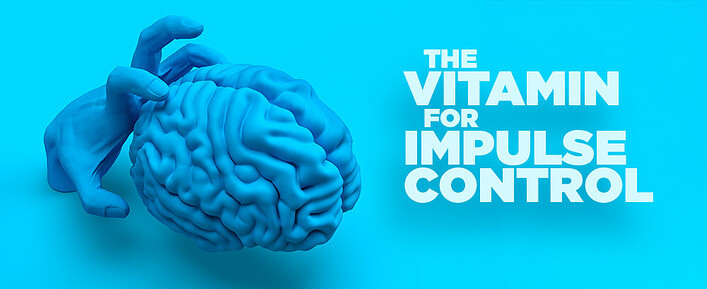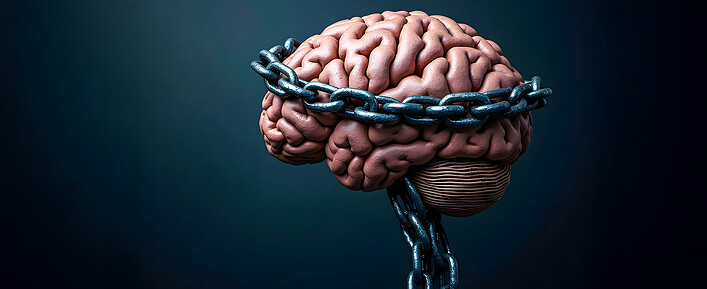by Chris Shugart
People lacking vitamin D have a harder time controlling their impulses. That could be you. Let's fix it.
Carlos has an explosive, unpredictable temper. Dana is addicted to online shopping. Mark has gambled himself into massive debt. Steven has money but can't stop himself from shoplifting. Henry can't rein in his sexual urges and cheats on his wife weekly. Sebastian compulsively pulls out his hair. Aaron eats himself sick at every meal. Lisa sets fires.
What do these people have in common? They all have a form of Impulse Control Disorder (ICD). In one way or another, they can't self-regulate.
Most of us don't suffer from these pathological forms of ICD, but we all work to control our everyday impulses. We do hard things today for later rewards (training and diet, for example), and we pause and reflect before acting on impulses. We think about the consequences of our actions and words. Well, most of the time.
But what if there were a way to increase your self-control and avoid those impulsive slips that can wreck your workout goals, diet, and relationships? There may be, and the idea stems from the study of severe ICDs. In short, make sure you're getting plenty of high-absorption vitamin D (Buy at Amazon).
Impulse Control Disorders and Vitamin D
In a scoping review published in Frontiers in Psychiatry, researchers reviewed dozens of studies examining the relationship between vitamin D levels and the presence and/or severity of ICDs.
In a nutshell, they found a negative relationship. That means lower vitamin D levels were associated with ICDs or the severity of their symptoms. In most cases, giving ICD sufferers vitamin D made it easier for them to control themselves. It's not a cure-all, but it reduces symptoms and makes other treatments for ICD work better.
But why? What does the "bone health" vitamin have to do with impulse control?
- Vitamin D Regulates Neurotransmitters: It modulates dopamine and serotonin pathways, critical for impulse control and reward-seeking behavior.
- Vitamin D Improves Mood and Stress Response: It enhances mood stability and reduces stress by supporting the HPA axis, decreasing emotional triggers that exacerbate impulsive behaviors.
- Vitamin D Supports Cognitive Function: It enhances prefrontal cortex activity, improving executive control and decision-making, which helps you resist impulsive actions.
- Vitamin D Reduces Inflammation: It lowers chronic inflammation that impairs brain function and increases impulsivity.
Could Vitamin D Help with "Everyday Impulse Control?"
Studies on non-clinical impulse control issues are limited, but the mechanisms of action make intuitive sense: get your brain working optimally, and it'll be ready to help you resist common impulsive temptations (cheating on your diet, procrastinating, binge-watching, binge-gaming, skipping workouts, mouthing off, etc.).
How well vitamin D works depends on your level of deficiency or insufficiency of this powerful neurosteroid. The more you need vitamin D, the better supplementation will work. However, a compilation of recent studies shows that 65-80% of the American population has suboptimal levels (<30 ng/mL). Do you think most Americans have impulse control issues? Seems like it.
What to Take
Studies focusing on the mental health aspects of vitamin D use 1000 to 6000 IU daily. Most of the time, the larger dosages are used to quickly correct a deficiency, then a smaller or less frequent dosage is used for maintenance.
But standard grocery-store vitamin D supplements don't work for many people, no matter how many they take. Guaranteed absorption requires a delivery system to increase bioavailability (especially in people over 40). Use microencapsulated D3 with caprylocaproyl polyoxyl-8 glycerides for best results, as found in D Fix High Absorption Vitamin D (Buy at Amazon).
Reference
- Jalilian-Khave, Laya, et al. "Potential Roles for Vitamin D in Preventing and Treating Impulse Control Disorders, Behavioral Addictions, and Substance Use Disorders: A Scoping Review." Frontiers in Psychiatry, vol. 15, 2024, article 1468056, doi:10.3389/fpsyt.2024.1468056.



